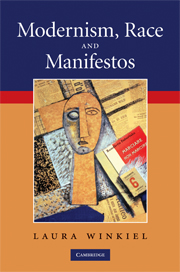Book contents
- Frontmatter
- Contents
- Acknowledgments
- Chapter 1 Introduction: manifestos, race, and modernity
- Part I COSMOPOLITAN LONDON, 1906–1914
- Chapter 2 Women's suffrage melodrama and burlesque
- Chapter 3 Futurism's music hall and India Docks
- Chapter 4 Vorticism's cabaret modernism and racial spectacle
- Part II TRANSNATIONAL MODERNISMS, 1934–1938
- Epilogue: Manifestos: then and now
- Index
Chapter 3 - Futurism's music hall and India Docks
Published online by Cambridge University Press: 22 September 2009
- Frontmatter
- Contents
- Acknowledgments
- Chapter 1 Introduction: manifestos, race, and modernity
- Part I COSMOPOLITAN LONDON, 1906–1914
- Chapter 2 Women's suffrage melodrama and burlesque
- Chapter 3 Futurism's music hall and India Docks
- Chapter 4 Vorticism's cabaret modernism and racial spectacle
- Part II TRANSNATIONAL MODERNISMS, 1934–1938
- Epilogue: Manifestos: then and now
- Index
Summary
Already the richness of this new art is apparent to those who know how to see. Its power is tremendous since it reverses all natural laws: it ignores space and time; it upsets gravity, ballistics, biology, etc. … Its eye is more patient, more penetrating, more precise. Thus the future belongs to the creator, the poet, who makes use of this hitherto neglected power and richness; for a new servant is available to his imagination.
Philippe SoupaultSoupault's prophecy that “the future belongs to the creator, the poet” who can harness the potential of cinema echoes the groundless optimism of avant-garde manifestos, particularly those of the futurists. The buoyant prewar futurist manifestos envisioned modernity (and especially new technologies such as the cinema) as a conquering force that could overturn “all natural laws,” including time and space. The creator who harnesses this power, Soupault predicts, can shape the future. That is, he makes history. In what follows, I connect modernity as a conquering force with the manifesto's break from the past (figured in futurist manifestos as black and female or passé and degenerate) to demonstrate how futurist manifestos and other texts supported Italy's bid to become a modern, imperial power.
But that's not all that these texts do. Recall that in Chapter 1, I argued that the manifesto's temporality is composed of both straightforward instrumentality – to start the revolution, now! – and theatrical hesitation and reflection that is ironic and parodic.
- Type
- Chapter
- Information
- Modernism, Race and Manifestos , pp. 82 - 120Publisher: Cambridge University PressPrint publication year: 2008



